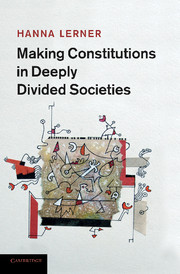Book contents
- Frontmatter
- Contents
- Acknowledgments
- Introduction
- PART I Constitutions, democracy, identity
- 1 Three paradigms of democratic constitutions
- 2 The incrementalist approach to constitution-making
- PART II Varieties of constitutional incrementalism
- PART III Arguments for and against constitutional incrementalism
- Conclusion
- Bibliography
- Index
2 - The incrementalist approach to constitution-making
Published online by Cambridge University Press: 25 October 2011
- Frontmatter
- Contents
- Acknowledgments
- Introduction
- PART I Constitutions, democracy, identity
- 1 Three paradigms of democratic constitutions
- 2 The incrementalist approach to constitution-making
- PART II Varieties of constitutional incrementalism
- PART III Arguments for and against constitutional incrementalism
- Conclusion
- Bibliography
- Index
Summary
The term “deeply divided societies” is commonly used by students of conflict resolution and institutional design. Most definitions of the term tend to focus on the intensity and comprehensiveness of societal conflicts – in other words, to its volume – without paying particular attention to its quality – to the nature of the schism. Consequently, distinctions are not typically made between various types of deeply divided society: whether the society in question is segmented along ethnic, religious or economic lines, or whether the division between groups is based on any other type of identity “with high political salience, sustained over a substantial period of time and a wide variety of issues.” But the nature of the schism is relevant in the context of drafting a constitution. Constitution-writing is an attempt to identify and to articulate the fundamental norms and values that are shared by “the people” in whose name and for whom the constitution is drafted. In the context of a struggle over the character of the state not all types of conflict have the same effect. Not all types of conflict can be addressed by the same constitutional tools.
This chapter begins by identifying and describing deeply divided societies as the term will be used in this book. It then reviews the various constitutional solutions commonly proposed for mitigating conflicts in multicultural, multinational or multilingual societies. It will discuss the limitations of these solutions when applied to deeply divided societies of the type discussed in the book.
- Type
- Chapter
- Information
- Making Constitutions in Deeply Divided Societies , pp. 30 - 46Publisher: Cambridge University PressPrint publication year: 2011



